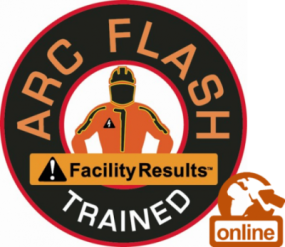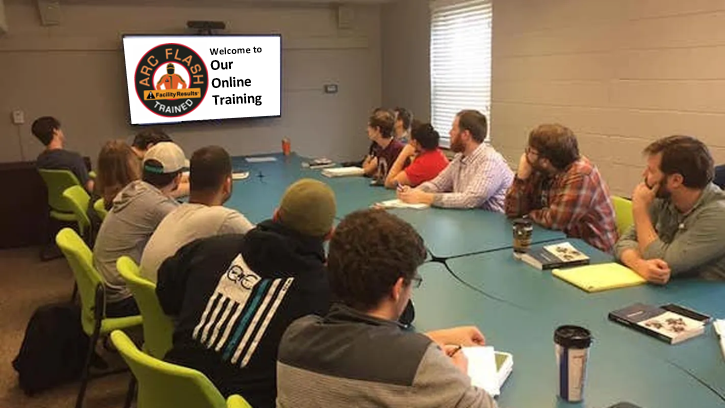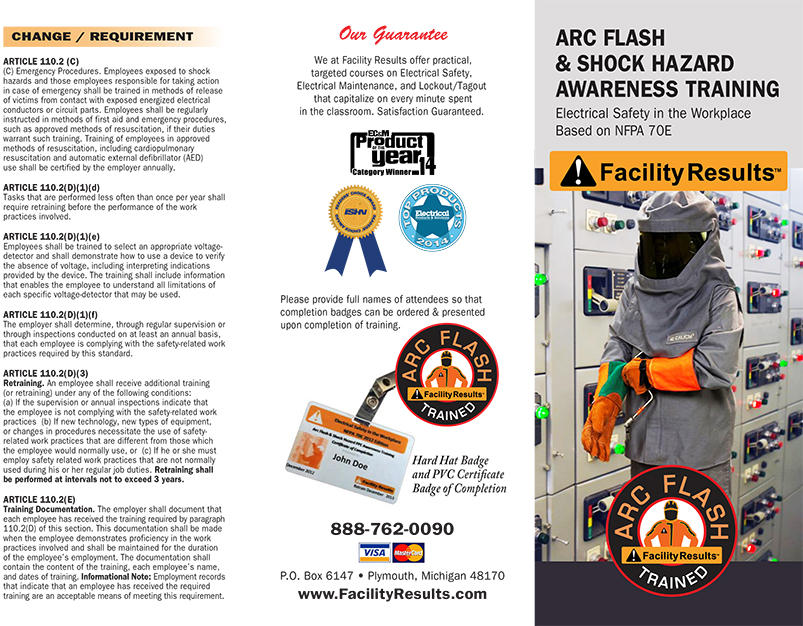NFPA 70E / Arc Flash - Electrical Safety Training (Online Instructor-Led)
Who should attend this Online Instructor-Led NFPA 70E / Arc Flash – Electrical Safety Training?
The following candidates should consider Online NFPA 70E / Arc Flash Training: Any person who may be exposed to live electrical equipment should consider attending the Online NFPA 70E training. Suggested attendees include managers, supervisors, engineers, contractors, safety professionals, preventive maintenance teams, and those responsible for employee safety. Our NFPA 70E Training is the ISHN Magazine Readers’ Choice Award Winner for Arc Flash Training. Arc Flash Training, Electrical Safety Training, NFPA 70E Certification, and Qualified Electrical Worker Training.



Overview:
Our Online NFPA 70E Instructor-Led course will showcase real-world examples of how to keep workers safe while working on or around electrically energized equipment. We ship all the NFPA 70E training materials and ID cards of Completion to you 10 days in advance of online arc flash training.
How it works: Once the date and time are set, an email will be sent to you containing the links to Zoom for accessing our live webinars.
According to OSHA, NFPA 70E, IEEE 1584, NFPA70, and ANSI
Maintain your knowledge with this excellent NFPA 70E Training introduction course to arc flash and electrical dangers. This course will address the complicated requirements and regulations set out by OSHA and NFPA 70E, as well as the most recent developments in OSHA’s enforcement of arc flash training. NFPA 70E training is available in 2-hours, 4-hours, or 8-hour sessions.
Arc Flash Training, Electrical Safety Training, NFPA 70E Certification, and Qualified Electrical Worker Training.

Some of the topics covered in our online Arc Flash Training include:
 Introducing practical, safe electrical work practices for the Qualified Worker
Introducing practical, safe electrical work practices for the Qualified Worker
 Using common sense to recognize and correctly assess risk hazards
Using common sense to recognize and correctly assess risk hazards
 Arc flash safety training and calculation basics
Arc flash safety training and calculation basics
 How-To’s for reading and interpreting labels
How-To’s for reading and interpreting labels
 Stepping through the proper operation of a disconnect switch (“The Six Steps”)
Stepping through the proper operation of a disconnect switch (“The Six Steps”)
 Selecting, inspecting, and caring for Personal Protective Equipment (PPE)
Selecting, inspecting, and caring for Personal Protective Equipment (PPE)
 Understanding what to look for on garment tags
Understanding what to look for on garment tags
 Assessing garment materials/samples, incl. full garments & cutting-edge materials
Assessing garment materials/samples, incl. full garments & cutting-edge materials
 Identifying the pros and cons of different safety garment materials
Identifying the pros and cons of different safety garment materials
 Demonstrating fitting techniques for deriving full PPE benefits
Demonstrating fitting techniques for deriving full PPE benefits
Other topics covered
- NFPA 70E Updates
- NFPA 70E / OSHA Training Requirements
- Hazards of an Arc Flash Event
- Conditions that affect the outcome of an arc flash
- Demonstrate safe work practices
- Proper Use of Safety Equipment
- Selection & Use of Protective Clothing for Arc Flash Protection
- Care of Personal Protective Equipment
- Proper Sizing of PPE & Options Available
- Basics of the Arc Flash Calculations
- Labeling Requirements
- Electrical Maintenance Requirement
- Value of a Coordination/Mitigation to Reduce Arc Flash Hazard Levels
- LOTO Review Based on NFPA 70E Establishing an Electrically Safe Work Identifies electrical hazards.
- Identify Causes of Arc Flash
- Explain the Biological Effects of Electrical Shock/Arc Flash
- Professional Code of Conduct
- Identify the Hazards and Risks Associated with Arc Flash
We can also travel to your site;
New York, NY, Los Angeles, CA, Chicago, IL, Brooklyn, NY, Queens, NY, Houston, TX, Manhattan, NY, Philadelphia, PA, Phoenix, AZ, San Antonio, TX, Bronx, NY, San Diego, CA, Dallas, TX, San Jose, CA, East San Gabriel Valley, CA, Austin, TX, Jacksonville, FL, San Francisco, CA, Indianapolis, IN, Columbus, OH, Toledo, OH, Fort Worth, TX, Charlotte, NC, Detroit, MI, El Paso, TX, Seattle, WA, Denver, CO, Washington, DC, Memphis, TN, Boston, MA, Knoxville, TN, Nashville, TN, Baltimore, MD, Murfreesboro, TN, Oklahoma City, OK, Portland, OR, Las Vegas, NV, Milwaukee, WI, Albuquerque, NM, Tucson, AZ, Fresno, CA, East Seattle, WA, Central Contra Costa, CA, Sacramento, CA, Staten Island, NY, Long Beach, CA, Northeast Tarrant, TX, Kansas City, MO, Mesa, AZ, Northwest Harris, TX, Atlanta, GA, Northeast Jefferson, CO, Virginia Beach, VA, Omaha, NE, Colorado Springs, CO, Raleigh, NC, Miami, FL, Oakland, CA, Minneapolis, MN, Tulsa, OK, Holland, OH, Grand Rapids, MI, Ann Arbor, MI, Battle Creek, MI, Flint, MI, Fenton, MI, Brighton, MI, Howell, MI, West, Michigan, West, MI, NE, Ohio, Northeast, OH, Northwest, OH, NW, Ohio
Now Servicing All Areas of Alaska with NFPA 70E Arc Flash Training
Anchorage, AK, Fairbanks, AK, Juneau, AK, Knik-Fairview, AK, Knik-Fairview, AK, Badger, AK, College, AK, Lakes, AK, Meadow Lakes, AK, Wasilla, AK, Tanaina, AK, Kalifornsky, AK, Stika, AK, Ketchikan, AK, Kenai, AK, Steel Creek, AK, Bethel, AK, Chena Ridge, AK, Sterling, AK, Palmer, AK, Gateway, AK, Kodiak, AK, Homer, AK, Fishhook, AK, Utqiagvik, AK, Farmers Loop, AK, Nikiski, AK, North Pole, AK
Onsite arc flash training locations
Our online training programs are designed to send compliant Qualified Workers back on the floor or back to the field quickly and safely so they can put their newfound knowledge to work.
According to the NFPA 70E, a “Qualified Person” is one who is trained and knowledgeable of the construction and operation of the equipment or the specific work method and is trained to recognize the hazards present.
Such persons shall also be familiar with the use of precautionary techniques, personal protective equipment, insulating and shielding materials, and insulated tools and test equipment.
A person can be considered qualified for certain standards and methods but still are unqualified for others.
Also, to be permitted to work within the limited approach of exposed energized conductors and circuit parts the person shall be trained in all of the following:
- The skills and techniques are necessary to distinguish exposed live parts from other parts of electric equipment.
- The skills and techniques are necessary to determine the nominal voltage of exposed live parts.
- The minimum approach distances specified in this section correspond to the voltages to which the qualified employee will be exposed.
- The decision-making process is necessary to determine the degree and extent of the hazard and the personal protective equipment and job planning required to perform the task safely.
Our industry-leading training will provide the highest level of knowledge in the most cost-effective platform. Our ISHN Readers’ Choice Award-Winning NFPA 70E Arc Flash training (Electrical Safety) for Qualified Workers can be done in 2-hours and meets the requirements for OSHA & NFPA 70E.
Facility Results’ Instructor-Led Online NFPA 70E / Arc Flash Training Program focuses on the practical application of the standard and emphasizes best practices for identifying and avoiding the hazards associated with arc flash.
These best practices have the potential to save lives, can prevent disabling personnel injuries and damage to buildings and equipment, and help your organization meet OSHA training obligations outlined in CFR 1910.331-335.
Arc Flash / NFPA 70E retraining in safety-related work practices and applicable changes in this standard shall be performed at intervals not to exceed three years.
[Note that the “every three years” rule is the default. Employees must be retrained at least every three years. There are circumstances where retraining in electrical hazard safety is necessary, even if it hasn’t yet been three years since the last training occurred. ]
An employee shall receive additional training (or retraining) if any of the following conditions exist:
(1) The supervision or annual inspections indicate that the employee is not complying with the safety-related work practices.
(2) New technology, new types of equipment, or changes in procedures necessitate the use of safety-related work practices that are different from those the employee would usually use.
(3) The employee must employ safety-related work practices that are not normally used during his or her regular job duties.
If your employees’ actions indicate that they’re not clear on electrical safety, or if their duties have changed, and now they work with electrical equipment that they did not work with previously, then they will need retraining.
If your electrical equipment has changed, or procedures for handling that equipment have changed, then the affected employees will need retraining.
Class size is limited to 10 seats to allow for quality discussions and group interaction. All electrical safety training material is based on the current NFPA 70E Standard for Electrical Safety in the Workplace & best practices.
Online NFPA 70E / Arc Flash training can be set during any shift at any time that is convenient for your team. This can help reduce and need for overtime pay and complex scheduling.
Industry Terms
- National Fire Protection Association (NFPA)
- NFPA 70E
- On-Site Arc Flash Training
- Video Arc Flash Training
- NFPA 70E Training
- On-Site NFPA 70E Training
- Arc Flash Labeling
- Arc Flash Analysis
- Arc flash
- Personal protective equipment (PPE)
- Limited and restricted approach boundaries
- Limits of approach
- Electrically safe work condition
- Electrical Safety Program
- Host and contract employers
- Qualified and unqualified persons
- Shock risk assessment
- Arc flash risk assessment
- Arc flash incident energy method
- Arc flash PPE category Method
- Electrical safety authority (ESA)
- Lockout/Tagout program (LOTO)
- Certified Electrical Safety Worker (CESW)
- Energized electrical work permit
- Arc flash PPE category
- Arc-rated apparel
- Safety grounding equipment
- Batteries, lasers, power electronic equipment
